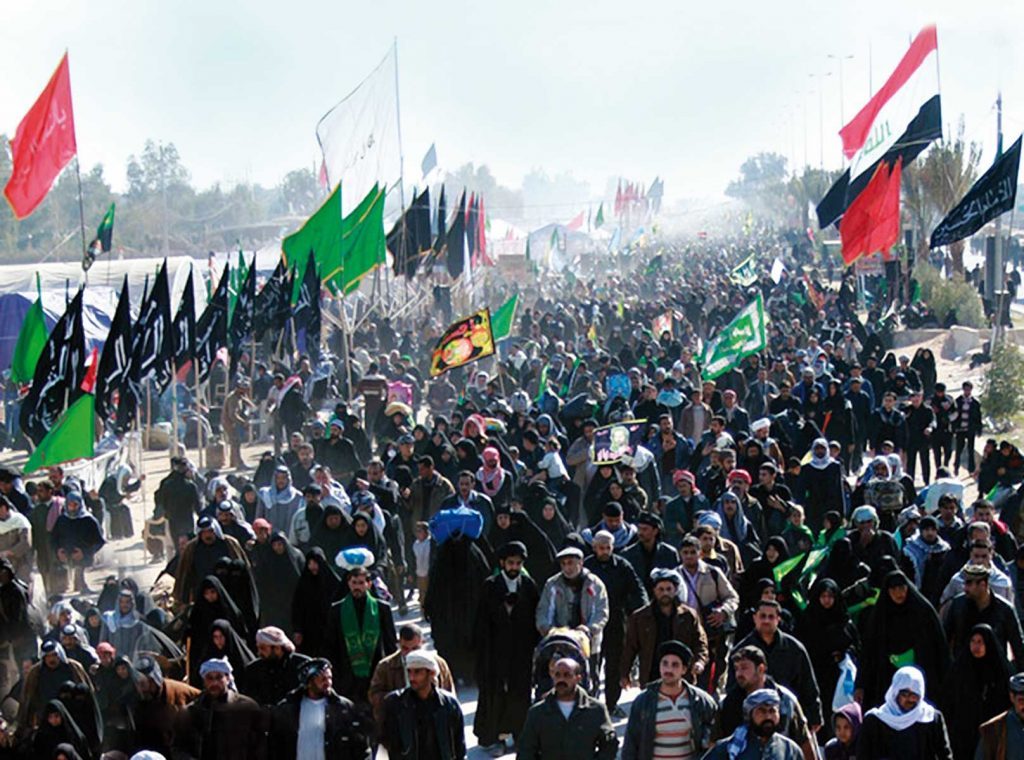Every year with the approach of Arbaeen* the lovers of Imam Hussein (AS) travel to Iraq from various countries and walk to Karbala. This millions-strong ceremony is one of the most powerful symbols of solidarity among the Shiite world. Arbaeen also includes Shia, Sunni, Christian, Izadi and other religions. In fact, it is the largest annual religious gathering in the world.
On the subject of Arbaeen, there are several important points which also contribute to foreign relations between governments and nations; one of the aspects of Arbaeen is the presence of the people in line with spiritual matters, transcendental issues and great values. When nations look at these values, they naturally avoid some of the challenges and conflicts in the periphery.
In other words, when the spirit gets transcendental, the essence of self-centeredness, aggression, oppression, and tyranny abandon these people. Those who take part in the march of Arbaeen and renew allegiance to Hussein bin Ali (AS) assume an anti-oppression spirit, and it is hoped that they will manifest this spirit inside them first and foremost. Imam Hussein (AS) said during his trip to Karbala: I did not rise out of rebellion, corruption and cruelty). In fact, this is the first aspect of Arbaeen which also affects the foreign relations.
The second aspect is one of unity and empathy, where various ethnicities and nationalities come together in pursuit of a common goal, and may endure even some hardships for the cause of unity. Enduring hardships and differences will lead to a better understanding and tolerance of fellow citizens and result in the strengthening of peaceful coexistence between nations and governments.
The third aspect of Arbaeen is the maneuvering effect this march leaves on the issue of security. Arbaeen’s multi-million rally, believed to stand at 20 to 30 million, affects the security of a nation more than several armies. Assuming an army on average is 100,000 strong a march of 20 or 30 million is tantamount to 200 to 300 armies. Undoubtedly, such a presence will ensure a lasting, continuous, internal and low-cost security to the states and nations and will make them invulnerable to the dangers.
Another aspect is related to the civilization debate, as one of the functions of the nations is civilization. The annual Arbaeen event is a civilization building event and a common theme of nations in a wide spiritual field. This joint intention of nations creates the spirit of a civilization, and this in some way affects the relationship between Muslim countries and their nations.
At the same time, in the Arbaeen march, religious and human affiliations become stronger and the differences and disputes between the demonstrators become less pronounced.
In the case of Iran and Iraq in particular, the event will further link the two nations and states, and will serve as a warning to enemies trying to divide Muslim nations.
The last but not the least, it should be noted that, given the unrest in the region, some of the protests in Iraq and the foreign intervention in the Middle East and Muslim affairs, the Arbaeen ceremony can serve as a model for the solidarity, unity and security of Muslim nations. In fact, the Arbaeen rally is a security building event, and fortunately in recent years we have seen no one dared to approach and threaten the Arbaeen marchers. This reflects the security created at the Arbaeen ceremony by various tribes, religions and groups.
*Arbaeen, Chehelom is a Muslim religious observance that occurs forty days after the Day of Ashura. It commemorates the martyrdom of Imam Hossein, the grandson of Prophet Mohammad, who was martyred on the 10th day of the month of Muharram.










0 Comments